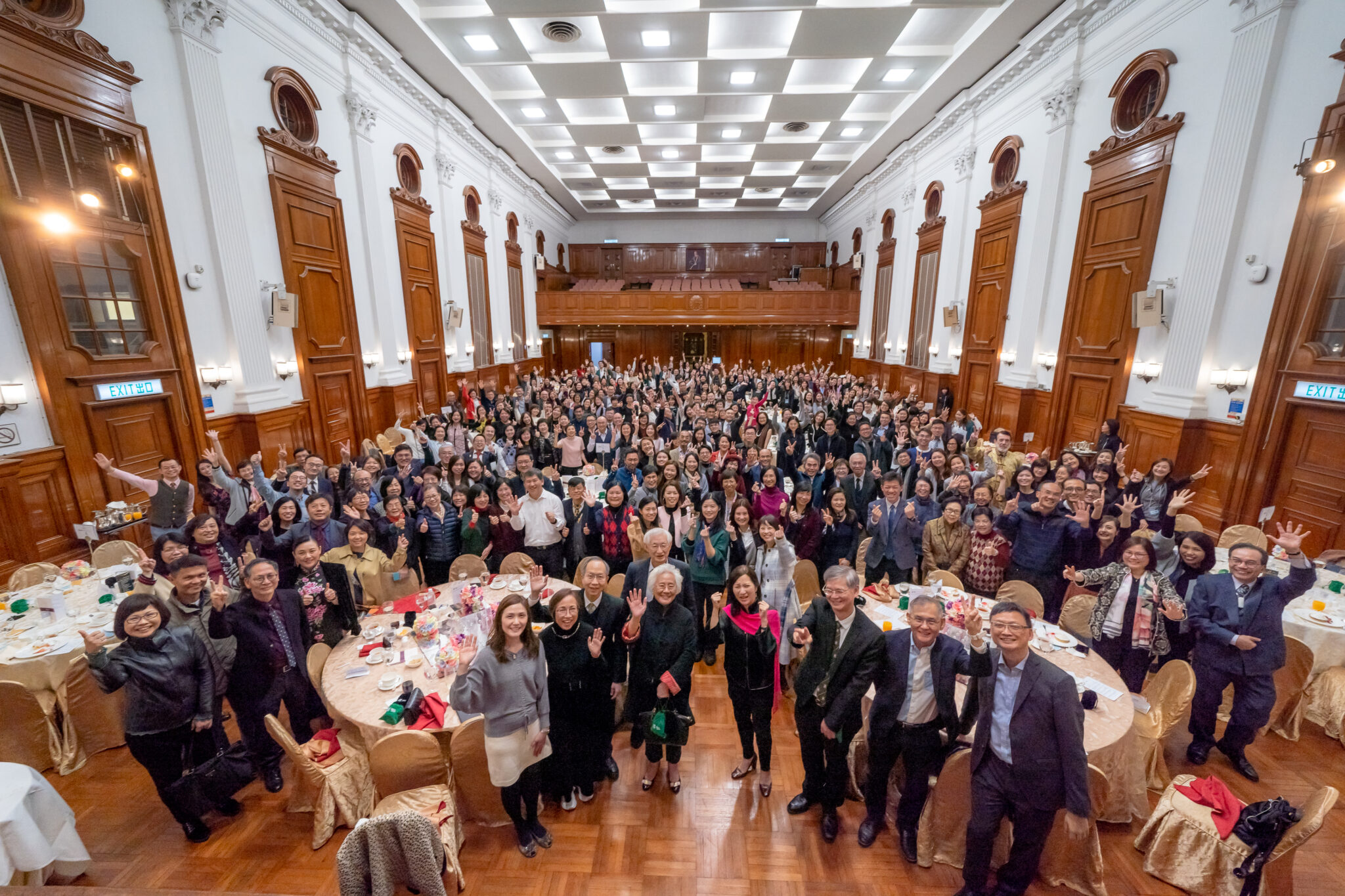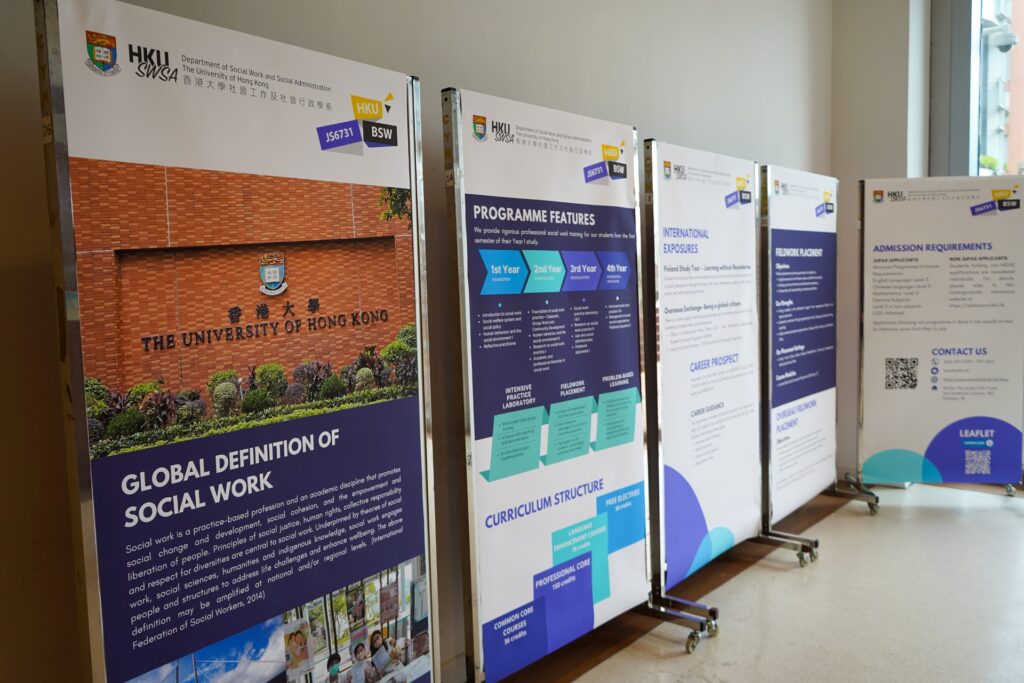MSocSc (Mental Health)
Director’s Message
Professor Samson Tse
Programme Director, Master of Social Sciences (Mental Health), HKU; Professor in Mental Health, Department of Social Work and Social Administration, HKU
I would like to express my warmest welcome …Welcome to the MSocSc in Mental Health programme at HKU—a vibrant and forward-thinking community of professionals dedicated to shaping the future of mental health care.
Here, learning goes beyond the classroom. Our programme brings together students and educators from diverse fields—social work, health care, psychology, human services sector, law, and more—creating a rich environment for interdisciplinary exchange. What connects us is a shared purpose: To improve mental health outcomes through innovative thinking, evidence-based practice, and meaningful collaboration.
Hong Kong stands at a critical juncture in mental health development. Our programme equips you to respond to these challenges with confidence—drawing on global insights, local expertise, and a strong foundation in research and policy. Whether you’re designing interventions, influencing systems, or contributing to reform, you’ll be part of a movement that drives real change.
As programme director, my role is to support your growth, listen to your ideas, and ensure your experience is both empowering and impactful. I invite you to engage fully, challenge assumptions, and help us co-create a learning journey that prepares you to lead with compassion and clarity.
Welcome aboard—we’re excited to see what you’ll bring to this journey.
Objectives
The ultimate objective is to facilitate aspiring and established healthcare and social service professionals to develop the necessary knowledge and skills to become competent clinical practitioners, administrative and/or clinical supervisors in their respective fields of work.
Learning Outcomes
After the completion of this programme, students should be able to
- Critical intellectual enquiry and acquiring up-to-date knowledge and research skills in mental health;
- Application of mental health knowledge and research skills to practice or theoretical exploration, demonstrating originality and creativity;
- Tackling novel situations and ill-defined problems in mental health;
- Collaboration and communication of mental health knowledge to specialists in social services and the general public;
- Awareness of and adherence to personal and professional ethics in mental health;
- Enhancement of leadership and advocacy skills in the mental health profession.
Who will benefit from the programme
The Master of Social Sciences in Mental Health is a self-funded two-year part-time postgraduate programme for medical doctors, nurses, social workers, psychologists, counselors, psychiatrists, dietitians, occupational therapies, physiotherapists, speech therapists, Chinese medicine practitioners, and other complementary and alternative medicine practitioners who are interested in mental health issues and practices.
Recognitions
In the Master of Social Sciences in Mental Health programme, students can choose to specialize in specific areas within mental health (i.e. Integrated Mental Health, Children and Youth Mental Health, Psychogeriatic Care, and Cognitive-Behaviour Therapy). Students who select the Cognitive-Behaviour Therapy concentration will receive training equivalent to the Level I training in CBT offered by the Institute of Cognitive Therapy. Additionally, they will be eligible to apply for membership with the Hong Kong Professional Counselling Association.
Candidates are required to complete 60 credits, including 5 compulsory courses (6 credits each), and three to five courses (6 or 12 credits each) or 3 elective courses (6 credits each) with a dissertation (12 credits). In the first year of study, students will acquire most current knowledge about the contexts, policies and practices in mental health. They will also be introduced to advanced and practical knowledge and skills in psychiatric assessment and mental health counselling. In the second year, students can choose to specialize in four areas in mental health (i.e. Integrative Mental Health, Children and Youth Mental Health, Psychogeriatric Care and Cognitive-Behaviour Therapy). Candidates can take courses in other fields of study under the Master of Social Sciences (Behavioral Health, Gerontology, Social Service Management, Social Work) programmes. Special approval from the respective Programme Directors for the courses in the above-mentioned fields of study is needed.
Compulsory Courses
This course covers the whole research process from the development of research questions and hypotheses to the analysis of data as well as presentation of findings. Different data collection methods from qualitative method, survey, experiment, case study, interviews, to focus groups will be discussed. Data analysis on various types of data including secondary data will be discussed. Students will be expected to integrate and apply the knowledge and skills they acquired through the programme by attending the oral presentation by the end of the first semester of the final academic year of study.
As part of practice competence, mental health workers should be able to take a critical stance in understanding and analyzing the policy contexts that affect their practice. The first half of the course will provide a general understanding of selected social policies in Hong Kong. It will also offer students an understanding of certain policy analysis frameworks. The second half of the course focuses on critically examining policy issues relating to mental health care. Topics such as policy trends in mental health care, legal contexts of mental health care, stigma and discrimination, rights of persons with mental illness and etc. will be explored. Overseas examples in mental health policies will be used for comparison.
This course critically examines current models of prevention, rehabilitation and treatments for people with mental illness. Topics such as prevention and rehabilitation, hospital and community care, models of social and vocational rehabilitation, models of psychological intervention, culture and mental health, multidisciplinary teamwork in mental health service, core competences of mental health workers/social workers and etc. By comparing these to overseas models of psychosocial approaches in mental health care, students can appreciate the strengths and weaknesses of the models that are at work in Hong Kong.
This course provides students with knowledge and skills in conducting psychiatric and psychosocial assessments on people with mental illness. Assessments on individual illnesses such as depression and psychosis will be taught using a bio-psychosocial perspective. The first 5 lectures cover the genetic and neurological bases of certain types of mental illness and the other 5 lectures will focus on the psychosocial factors in the etiology and development of certain types of mental illness. Students will be introduced to selected neurological, psychological and psychosocial assessment tools that are commonly used in measuring the mental health characteristics and statuses of a person with mental health concerns. Practical skills in using these assessment tools will be taught during classes.
This course introduces students to a variety of current evidence-based psychological intervention approaches that are effective for working with people with mental health problems. As an overview, this course covers traditional approaches such as psychodynamic, humanistic, behavioural and cognitive and interpersonal approaches and postmodern approaches such as narrative approach, mindfulness approach, and motivational interviewing. In addition, some family perspectives such as structural family therapy will also be included. Case examples will be used to illustrate how these individual approaches can be applied to work with people with mental illness. Evidences about their effectiveness in working with people with mental illness will also be provided. Some lectures may also involve experiential learning and skills training. Assessment: 100% coursework.
Dissertation option: Candidates shall complete three of the following 6-credit courses. Non-dissertation option: Candidates shall complete three to five courses (6 or 12 credits each). If interested, candidates can choose courses to make up one of the four areas of concentration: (1) Integrative Mental Health (2) Children and Youth Mental Health, (3) Psychogeriatric Care and (4) Cognitive-Behaviour Therapy.
Elective Courses
Emotionally focused therapy (EFT) is an attachment based approach that utilizes the power of empathic attunement and experiential interventions to facilitate a felt sense of security with oneself and others. In the context of individual therapy in EFT, the therapist tunes into the emotion processes of the client and works to facilitate corrective emotional experiences. These new, healing emotional experiences build capacities in regulating emotions and shape a sense of trust in one’s worthiness and competence.
This course provides a theoretical overview of the EFT approach in the context of individual therapy (EFIT) with an emphasis on the experiential practice of empathic attunement and EFT interventions. Students will learn the roadmap of EFT, apply practical interventions on how to attune to the here-and-now emotions, and facilitate processes that promote more secure and flexible models of self and others. Neuroscience is introduced to help students to understand its role played in emotional changes.
Assessment: 100% coursework
The course introduces students to the Beck’s cognitive-behaviour therapy model in working with people with depression and anxieties. A case process approach will be adopted to provide a stage-by-stage and step-by-step understanding of the theory and practice of Beck’s CBT. Other CBT models for working with people with psychosis, OCD, pathological gambling, substance abuse and etc. will also be discussed in class.
Assessment: 100% coursework
This course explores the types of mental illnesses among the elderly in Hong Kong. Attention will be put towards the understanding of the causes and treatments of mental illness in the elderly population. A critical review of medical, psychological and social services for the elderly with mental illness will be conducted.
Assessment: 100% coursework
This course focuses on an understanding of the mental health issues found among children and youth in Hong Kong. While it will introduce the developmental perspectives on child and adolescent development, it will also provide an overview of the prevalence and general features of different childhood and adolescent mental health problems. The course will also bear a practice focus and introduce to students the assessment, treatment and skills in engaging children and youth suffering from various mental health problems.
This course adopts a CBT case process model and provides step-by-step intensive and hands-on training of cognitive-behaviour therapy skills for students who are interested in practicing CBT. Cognitive-oriented techniques such as thought stopping, cognitive restructuring, cognitive continuum and pie chart will be taught, while behavioural techniques such as activity ruler, activity chart, behavioural experiment and exposure will also be introduced to the students. It is expected that students would actively participate by practicing the various skills, engaging in role plays and other activities in class. Students who intend to enroll in this course must have taken SOWK6127 Cognitive-behavioral interventions or an equivalent. As it is an intensive skill-oriented training, the optimum class size is 12 students.
Mental health is an integral and essential component of health. There is no health without mental health. Various psychological, emotional, biological and socioeconomic factors determine the level of mental health of a person at any point of time. Mental well-being is associated with our rapid changing society. This course will introduce students to mental health topics or issues in our contemporary society. For example, mental health policy and services, maternal and child mental health, neurological issues and problems in mental health, and suicide prevention. Assessment: 100% coursework
Mental health is an integral and essential component of health. There is no health without mental health. Various psychological, emotional, biological and socioeconomic factors determine the level of mental health of a person at any point of time. Mental well-being is associated with our rapid changing society. This course will introduce students to mental health topics or issues in our contemporary society. For example, mental health policy and services, maternal and child mental health, neurological issues and problems in mental health, and suicide prevention.
Assessment: 100% coursework
Mental health is closely associated with our rapidly changing society. This course will introduce students to mental health topics and issues in our contemporary society – including public policy; causes and prevention; treatment and support; resource allocation challenges; discrimination and stigma; and inequalities. These issues will be covered at different points across the life-course, with examples covering topics such as maternal mental health; child and adolescent mental illness and its adulthood consequences; recovery; workplace issues; family impacts and roles; suicide; and dementia. Students will gain in-depth understanding about mental health challenges and policy responses, especially from an economic perspective; risk factors for mental illness; economic evaluation of mental health interventions and policies, including methods and applications of cost-effectiveness and cost-utility analyses; policy analysis. Illustrative real-world examples will be used throughout the course, such as mental health policy in England today, economic evaluation of medication and nonpharmacological interventions for common mental disorders and severe mental illnesses, projection and other modelling to inform national dementia care policy.
Assessment: 100% coursework
The course adopts a “case-study” format in which students are required to provide counselling for up to ten to twelve clients using cognitive-behavior interventions, over a period of two semesters. Students are required to complete 120 hours of direct client contact, 52 hours of individual and group supervision, 4 hours of briefing sessions and 32 hours of skill-based workshops. Upon completion of this course, students may be eligible for the membership of Hong Kong Professional Counselling Association.
Pre-requisite: SOWK6127 Cognitive-behavioral interventions or an equivalent, and SOWK6311 Cognitive-behaviour therapy skills training.
Assessment: 100% coursework
The course adopts a “case-study” format in which students are required to provide counselling for up to five clients using cognitive-behavior interventions, over a period of two semesters. Students will have to report in class the progress of their treatment sessions. Through case discussions and group supervision, students will learn the process and techniques of cognitive-behavior interventions. Upon completion of this course, students will be awarded a certificate equivalent to Level I Certificate Training in Cognitive Behaviour Therapy from Institute of Cognitive Therapy of Hong Kong.
Pre-requisite: SOWK6127 Cognitive-behavioral interventions or an equivalent, and SOWK6311 Cognitive-behaviour therapy skills training.
Assessment: 100% coursework
Dementia care and interventions can improve cognition, behavioural and psychological symptoms, and other outcomes in people with dementia and wellbeing of carers. This course equips current and future practitioners with the fundamental understanding and skills in delivering evidence-based non-pharmacological interventions in dementia, covering the entire course of illness from mild to severe, including Cognitive Stimulation Therapy (CST), Tailored Activity Program (TAP), multicomponent carer support programmes, and dementia care management; as well as case identification and evaluation of intervention outcomes.
Pre-requisite: SOWK6201. Mental health problems in old age
Assessment: 100% coursework
Recovery is “A deeply personal, unique process of changing one’s attitudes, values, feelings, goals, skills and roles. It is a way of living a satisfying, hopeful and contributing life even with the limitation caused by illness.” (Anthony, 1993). Recovery-oriented practices are empowering approaches that embrace person-centered alternatives for promoting hope, self-determination, self-management, wellbeing and social inclusion of people in face of mental distress. Such humanistic approaches have been gaining international credence among mental health service users, service providers, professionals and policy makers in recent years.
Grounding on the recovery paradigm, this course aims to walk you through the re-authoring elements of recovery, and the latest knowledge on recovery-oriented practices for mental health counselling and the promotion of wellbeing. It will provide you with the evidence- and experienced-based knowledge of non-pharmacological approaches and postmodern practices including story-telling, narrative therapy, the strengths model assessment and intervention, Wellness Recovery Action Plan etc. You will be guided to see how these practices are not only applicable to counseling in mental health context but also to working with people coping with other issues and challenges in life. You will also have the opportunities to learn and practise the various conversation maps of narrative therapy through experiential exercises during the course.
This course introduces students to a variety of current intervention approaches that are effective for working with people with health and mental health problems. These may include narrative therapy, solution focused therapy, art and music therapies, mindfulness-based intervention, body-mind-spirit approach, Satir family therapy and etc. Candidates will be provided with experiential training on skills/techniques in working with patients in hospitals and in the community.
Assessment: 100% coursework.
Early intervention in mental health refers to the early identification and treatment/care of people with mental illness, and prevention/delay of illness onset in subclinical populations. For common mental disorders and severe mental illness, early interventions are at the forefront of clinical and scientific advances, including therapy and service designs that improve access to evidence-based interventions. This course provides a systematic introduction to local and international developments in early intervention in mental health from a life course perspective, with a focus on youth and older people to illustrate early intervention modalities, such as the ‘third wave’ of cognitive behavioural therapy, peer support, digital, and low-intensity psychotherapies.
Assessment: 100% coursework
Mental health problems in old age are common and can have deleterious consequences, including disability and death. Age-appropriate early interventions can be effective in preventing or minimizing mental health problems and their complications in older people. Building on a foundation of knowledge and skills in early intervention in mental health, this course provides further insight into the tailoring, adaptation, and co-creation of interventions with older adults, applying in-depth knowledge about psychological ageing and lifespan development for key psychosocial interventions and care. Pre-requisite: SOWKXXXX. Early intervention in mental health
Assessment: 100% coursework
Most adult mental illnesses onset before age 25 years. Adolescence is a window of opportunity for early interventions, which need to consider age-specific biopsychosocial development, system/context (family, school, social media), and risk/protective factors (peer relationship, bullying). Building on a foundation of knowledge and skills in early intervention in mental health, this course provides further insight into the tailoring, adaptation, and co-creation of interventions with young people, applying in-depth knowledge about developmental stage and life course determinants for key psychosocial interventions and care.
Pre-requisite: SOWK7014. Early intervention in mental health
Assessment: 100% coursework
(1) Candidates can take elective courses from both the core and elective courses in other fields of study under the Master of Social Sciences (Behavioral Health, Counselling, Gerontology, Nonprofit Management, Social Service Management, Social Work) programmes. Approval from the respective Programme Directors is needed.
(2) Not all elective courses will necessarily be offered in a given year.
SOWKXXXX** Subject to the University’s approval
Dissertation
Student can opt for dissertation for two additional elective courses.
The title of the dissertation shall be submitted for approval not later than five months before the formal submission of the dissertation or not later than March 31 of the same academic year of study. The dissertation shall be presented by not later than August 1 of the same academic year of study. The dissertation shall be a critical study that demonstrates the application of research methodology to the investigation of problems relevant to the field of study, and shall not exceed 20,000 words in length.
The Master of Social Sciences in Mental Health programme equips graduates with a comprehensive foundation of knowledge and skills highly applicable across a wide range of professions and career paths. Many alumni have leveraged their training to embark on new professional journeys, pursue further postgraduate studies, or attain advanced qualifications in related fields. Ultimately, this training not only supports professional growth and career progression but also enables graduates to make meaningful contributions to the community, underscoring its broad relevance and adaptability across various human service disciplines.
Applicants shall hold a Bachelor's degree of HKU or an equivalent qualification from a comparable institution, and preferably have a minimum of two years of relevant post-qualification working experience. Candidates with qualifications other than a Bachelor's degree will be considered on their individual merits. Qualifying examinations to test the applicants' abilities to follow the prescribed courses and/or interviews may be conducted.
Applicants with qualifications from a university or comparable institution outside Hong Kong where the language of teaching or examination is not English are required, unless exceptionally exempted, to obtain:
- a score of 550 or above (paper-based test) or 80 or above (internet-based test) in the Test of English as a Foreign Language (TOEFL); or
- a minimum overall band of 6 with no subtest lower than 5.5 in the International English Language Testing System (IELTS); or
- grade C or above in either the Overseas General Certificate of Education, the International General Certificate of Secondary Education, or the Cambridge Test of Proficiency in English Language.
(TOEFL applicants should request the Educational Testing Service (ETS) to send an official score report to the University [TOEFL code 9671] direct.)
Please refer to the guidelines >>HERE<<
The tuition fee is HK$231,840 (HK$115,920/year) for 2 years of part-time study.
The online application will be available from October 2025. To apply, please click https://admissions.hku.hk/tpg/.
Application and payment of application fees (HK$600 per application) should be made online at https://admissions.hku.hk/tpg/. Your online application cannot be processed unless you pay your application fee online by credit card (VISA or MASTERCARD only).
Important Dates
| Activities | Date | |
|---|---|---|
| Information Session I | 7 Nov 2025 6:30pm – 7:30pm CPD LG.59, Centennial Campus, HKU | |
| Information Session II | 27 Feb 2026 7:00pm – 8:00pm Online via Zoom Registration | |
| Application Opens | 15 Oct 2025 | |
| Deadline of Online Application | Round 1: 2 Dec 2025, noon Round 2: 17 Mar 2026, noon Round 3: 28 Apr 2026, noon | |
| Admission Test and Interview | Round 1: 12 Jan 2026 | |
| Announcement of Results (Provisional Offer) | Round 1: Mid to late Feb 2026 Round 2: Early to mid-May 2026 Round 3: Late May 2026 | |
Candidates may apply for more than one programme. However, as the selection panel for each programme is different, you must submit separate applications along with relevant sets of supporting documents and pay the corresponding fees for each application. Please note that even if they are admitted to more than one programme, they will only be allowed to enroll in one of them.
According to the HKU General Qualifications for Admissions, concurrent registration by a student of this University for another post-secondary qualification at this University or another institution is not permitted, unless approval of the Senate has been obtained in advance.
The Hong Kong Immigration Department issues student visas to part-time students on a limited number of days only. Please refer to their website https://www.immd.gov.hk/eng/services/visas/study.html for details.
All courses are to be taught in a face-to-face format. Online and hybrid learning modes were offered solely because of unexpected circumstances.
Applicants with qualifications from a university of comparable institution outside Hong Kong where the language of teaching or examination is not English are required to satisfy the University’s English language requirements for admission.
Hong Kong residents may apply for an Extended Non-means-tested loan (ENLS loan) from the government’s Extended Non-means-tested loan scheme. Please check for more from the Government Student Finance Office (SFO) https://www.wfsfaa.gov.hk/sfo
No. Only online application would be accepted.
Please refer to the guidelines here
Transcripts, diplomas, certificates, and other submitted documents that are not in English should be accompanied by a certified English translation. It can be issued by the issuing authority, or certified translators. A certified translation document should bear a seal of the translator and its certification body
Only shortlisted candidates will be invited to attend a written test and a group interview. The interview will be conducted in face-to-face group format.
Online admission test and interview are applicable only to candidates not residing in Hong Kong. Candidates in Hong Kong are required to attend both sessions face-to-face on the HKU Campus.
No. Places are offered on a first-come-first-serve basis. Due to keen competition, potential candidates are strongly encouraged to apply earlier.
Prof. Samson Tse
Programme Director
- samsont@hku.hk
Programme Enquiry
- mssmh@hku.hk
- (852) 3917 2075





